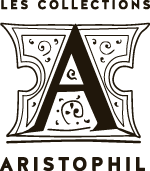Lot n° 54
Estimation :
1000 - 1500
EUR
Result with fees
Result
: 1 040EUR
COCTEAU JEAN (1889-1963).
3 autograph MANUSCRITS, the 2nd signed "Jean Cocteau", [1946-1948]; 15 pages various sizes.
Three texts on cinema.
[1946], about Beauty and the Beast and the cinema (1 page in-fol. filled in with blue ballpoint pen at the back of a booklet in-fol.
edited by "Victoire", National Organization of the Fighting Solidarity, printed at 2000 copies on vellum of Rives, cover illustrated by Dominique, with illustrations out of text by Paul Colin, Guy Arnoux, Albert
Decaris, Raymond Brenot). "One day when I asked Renoir why he never went to see his films, he answered that he could not, alas, improve himself and that he was sick of it. It attracts us, devours us and fixes us. During the work on Beauty and the Beast, the simple manual work emptied my head and prevented me from judging myself. Then it is the order of the disorder, [...] the spirit gets stuck and paralyzes the judgment. You have to wait. And what to do about it? The thing is done. Impossible to change"... Cocteau explains that he was late in finding "the true ending" of his film: "this new ending conditioned a whole reworking of the images. [...] My team had given the role of the Beast its full radiance. And when Jean Marais changes into Prince Charming, she could not take it anymore.
The result is that the public loves the beast and misses him. She prefers the caterpillar to the beautiful butterfly that comes out of it"... Etc.
Around a film, [1947] (10 pages and a half in-4 on the back of sheets with the letterhead Maison du Bailli, rue du Lau, Milly (S.-&-W.), slight traces of rust). On L'Éternel Retour and the art of film. [Directed in 1943 by Jean
Delannoy, on a script and dialogues of Cocteau, The Eternal Return, modern transposition of the legend of Tristan and Yseult, met a great success. This is a speech intended to present a revival of the work in a film club; the allusion to the 16mm film (Coriolan), as well as to Beauty and the Beast, allows us to date it to 1947]. "I laughed a lot at certain articles in London where they accused The Eternal Return of being of Germanic inspiration because of its blond heroes and, I imagine, because of Wagner's opera. But Tristan belongs to England and to France... If he belongs "to the generation that fought against Wagnerism", Cocteau has laid down his arms: "I let myself be carried along by the waves of Wagner, I let his potion work", but he has not thought of using it. "There are very few great love stories, triumphs of the couple. Tristan is the type. I wanted to put an illustrious legend among all, at the rhythm of our time and prove that NIETZSCHE's Eternal Return could be translated by the eternal return through the centuries of coincidences, surprises, obstacles and dreams provoking an intrigue that other people relive without even realizing it. [...] Wonder and poetry do not concern me. They must attack me by ambush. [...] That is why I am as attached to living in Belle's family as I am to living in the Beast's castle"... And he evokes
Le Sang d'un Poète : "This blood which disgusts us obliges us to turn our heads away and prevents us from enjoying the discoveries (by discoveries they mean : the entrance in the ice, the statue which moves, the heart which beats)"...
As for the cinematograph, "I believe that the progress of its soul does not depend on the progress of its machines"; this is why Cocteau turned to the 16 millimeter, "the perfect weapon with which the poet can hunt for beauty, alone, free, his shotgun on his shoulder"... To finish, he specifies what exactly his role was: "L'Eternel Retour is a film on which I only exercised a friendly surveillance. DELANNOY directed it.
I thank all the team and Madeleine
SOLOGNE for whom I invented a hairstyle, without knowing that Veronika Lake invented it at the same minute in Hollywood, and Jean
MARAIS who arrives, in the last reel of the film, on the highest summits to which an actor can claim". And he concludes: "The cinematograph is only fifty years old.
That is very young for a muse. It is still taking its first steps. It is, in my opinion, on its way to becoming the complete art par excellence, a theater of the masses where neither music, nor dance, nor speech, nor the Greek mask (the close-up) nor the whisper that hundreds of ears can hear, nor anything that composes the drama is missing. But in order to use it well, it is important that the author not only does not despise it, but gives himself up to it body and soul. [...] Nothing ages better than a beautiful film".
Radio texts on Yvonne de Bray, [1948] (3 pages in-4 filled in pencil, on the false-title and the last two leaves of an exhibition catalog of the painter and decorator MAYO : Mayo. Preface by Jean-Louis Barrault. Poem by Jacques Prévert, Galerie Dina Vierny. 1948; ex. n° 53 on Arches vellum; small in-4 bro
My orders
Sale information
Sales conditions
Return to catalogue

